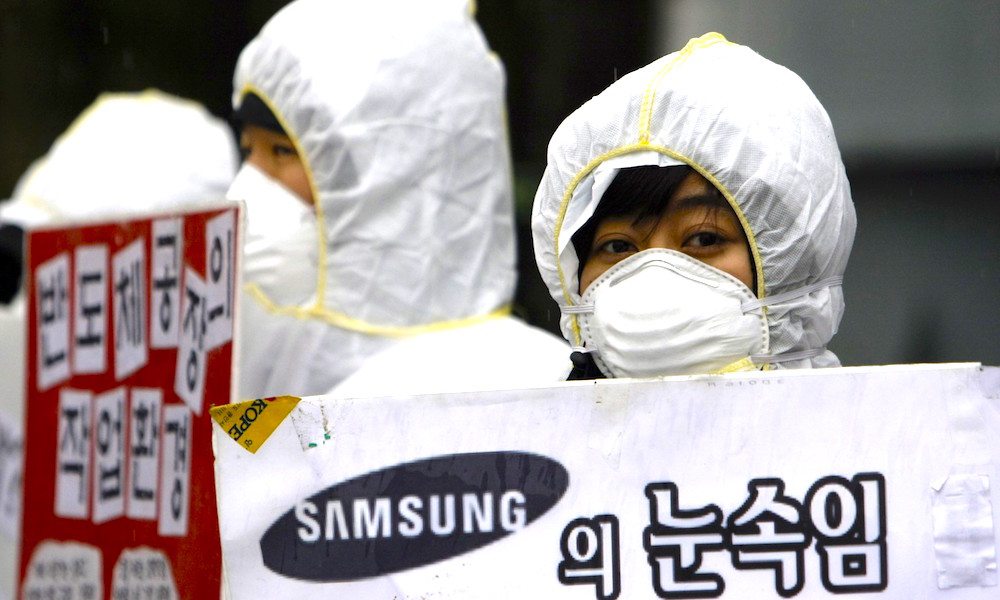Apple Component Supplier and Arch Rival, Samsung, Accused of Poisoning 200 Workers

Toggle Dark Mode
In a bizarre and alarming turn of events, one of Apple’s long-time component suppliers, Samsung, was recently accused of exposing some of its factory workers to near lethal amounts of toxic chemicals — including hydrofluoric acid, benzene, radiation, and other carcinogens — prior to apparently “covering up” said exposure, by withholding vital information about the nature of those chemicals from workers and their families.
According to a recent Associated Press report from publication contributor, Youkyung Lee, a South Korea-based worker safety advocacy group was responsible for documenting over 200 individual cases of serious illness — 76 of which have so far resulted in death — contracted by Samsung employees while working in one of the company’s South Korean LCD and semi-conductor manufacturing facilities.
The report alleges that workers as young as 20 had, during their tenure at Samsung, been exposed to the aforementioned toxic elements — which, in turn, resulted in their contraction of severe illnesses, such as Leukemia, Lupus, Lymphoma, Multiple Sclerosis (MS), and other anomalies.
However, for reasons unknown, Samsung was reportedly able to “skirt the system” — in that it was allowed to get away with concealing information about the origins of the toxic chemicals responsible for catalyzing those illnesses and deaths.
In a perceptibly sick and twisted, real-life horror story, the AP report even alleges that one 22-year-old factory worker was offered one billion won ($910,000) in exchange for “keeping silent” — prior to the young woman’s death from Leukemia. In another chilling instance, a woman who’d gone blind after contracting Multiple Sclerosis went on record indicating that, ”there was never any education [at the factory] about what kind of chemicals could be bad so that we could be more careful.”
Similarly, a worker from one of Samsung’s chip fabrication plants, who reportedly developed breast cancer during her time working at the factory, alleged that the South Korean tech-giant “brought uninformed kids from the countryside and acted like money is everything, using them as if they were disposable cups.
Meanwhile, on the other side of the globe, Apple’s status as a dominant device manufacturer has resulted in the tech-titan enduring its own onslaught of reproach — for not enforcing standards that would help protect its device handlers from being exposed to certain toxins while working in factories abroad.
In response to the criticism, Apple has since established and enforced a strict set of Supplier Accountability Standards, which its Far East component suppliers and manufacturing partners must adhere to in order to retain their status as a partner.
As for Samsung, however, the Galaxy S manufacturer certainly isn’t the first firm to be called out for its unsafe practices, such as compromising worker safety and welfare. In fact, among several low-end Chinese smartphone manufacturers — including Xiaomi, OPPO, Huawei, and others — there actually exists a well-documented pattern of skirting various environmental regulations.
Making Amends?
Despite the scathing AP report alleging that upwards of 30 former Samsung factory workers have so far filed claims with the South Korean Workers’ Compensation and Welfare Service (SKWCWS), particularly in relation to their contraction of debilitating or terminal illnesses, it appears that very few claims have yet to be honored (or even acknowledged) by the South Korean government.
A 2013 film which sought to shed some light on these aforementioned atrocities ultimately prompted an uproar at Samsung — followed by a few, sincere apologies from the company. However, as The Wall Street Journal noted in an October 2013 piece responding directly to the film, a Seoul, South Korea Administrative Court ultimately ruled that “toxic chemicals at Samsung plants ‘had caused or, at least, expedited the illness’ of [at least] two workers.
Yikes!
What do you think about these allegations and reported illnesses? Let us know in the comments!






